 Film Soundtrack, 1997 (Walt Disney Records)
Film Soundtrack, 1997 (Walt Disney Records)  (3 / 5) Hercules may not be a Disney masterpiece, but it’s one of the studio’s wittiest animated musicals, leaning heavily on meta-humor and pop-culture riffs — especially those skewering celebrity, sports, and marketing. Loosely based on a mash-up of Greek myths, it follows a gangly, misfit demigod as he gains strength and confidence, battles monsters, finds love, and learns what it truly means to be a hero. But instead of taking a traditional, noble-story-telling route, the Mouse House counterintuitively turned this ancient epic-for-the-ages into a goofy, full-tilt screwball comedy fueled by thunderous funk and gospel music that could wake the entire Olympian pantheon. Like all adapted musicals of the Disney Renaissance, it has deep theatrical roots, including, in a special flourish, some of the film’s character designs having been inspired (sometimes obviously so) by the sinuous linework of none other than Al Hirschfeld. And looming over it all is the symposium of divas who periodically wail out the sung narration: Real-life Broadway goddess Lillias White leads a sassy, syncopated Greek chorus of Muses that includes her fellow Broadway veterans LaChanze, Cheryl Freeman, and habitual scene-stealer Roz Ryan alongside Vaneese Y. Thomas. Much of Alan Menken’s rousing orchestral score for the movie is heard on the album, plus about 20 minutes of original songs that Menken wrote with lyricist David Zippel. All of the songs land solidly, including an obligatory, humongous Disney production number, “Zero to Hero,” which chronicles Herc’s meteoric ascent from nobody to action-figure media star. Praise also for Susan Egan as fast-talking love interest Megara, wryly channeling Barbara Stanwyck in The Lady Eve; Danny DeVito as Herc’s crotchety trainer/satyr Philoctetes (“Call me Phil”); and, of course, Roger Bart, who in singing the title role offers two wondrous performances of the Oscar-nominated motivational anthem “Go the Distance,” first as a reflective ballad and then an exhilarating, clarion reprise in which Bart flies high as Pegasus. — Mark Robinson
(3 / 5) Hercules may not be a Disney masterpiece, but it’s one of the studio’s wittiest animated musicals, leaning heavily on meta-humor and pop-culture riffs — especially those skewering celebrity, sports, and marketing. Loosely based on a mash-up of Greek myths, it follows a gangly, misfit demigod as he gains strength and confidence, battles monsters, finds love, and learns what it truly means to be a hero. But instead of taking a traditional, noble-story-telling route, the Mouse House counterintuitively turned this ancient epic-for-the-ages into a goofy, full-tilt screwball comedy fueled by thunderous funk and gospel music that could wake the entire Olympian pantheon. Like all adapted musicals of the Disney Renaissance, it has deep theatrical roots, including, in a special flourish, some of the film’s character designs having been inspired (sometimes obviously so) by the sinuous linework of none other than Al Hirschfeld. And looming over it all is the symposium of divas who periodically wail out the sung narration: Real-life Broadway goddess Lillias White leads a sassy, syncopated Greek chorus of Muses that includes her fellow Broadway veterans LaChanze, Cheryl Freeman, and habitual scene-stealer Roz Ryan alongside Vaneese Y. Thomas. Much of Alan Menken’s rousing orchestral score for the movie is heard on the album, plus about 20 minutes of original songs that Menken wrote with lyricist David Zippel. All of the songs land solidly, including an obligatory, humongous Disney production number, “Zero to Hero,” which chronicles Herc’s meteoric ascent from nobody to action-figure media star. Praise also for Susan Egan as fast-talking love interest Megara, wryly channeling Barbara Stanwyck in The Lady Eve; Danny DeVito as Herc’s crotchety trainer/satyr Philoctetes (“Call me Phil”); and, of course, Roger Bart, who in singing the title role offers two wondrous performances of the Oscar-nominated motivational anthem “Go the Distance,” first as a reflective ballad and then an exhilarating, clarion reprise in which Bart flies high as Pegasus. — Mark Robinson
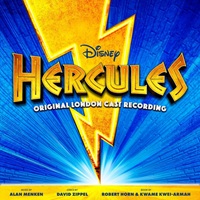 Original London Cast, 2025 (Walt Disney Records)
Original London Cast, 2025 (Walt Disney Records)  (2 / 5) After its 2019 debut at the Delacorte Theater in Central Park and subsequent tune-ups in New Jersey and Germany, Hercules finally muscled its way into an open-ended West End run in 2025. As with many Disney screen-to-stage ventures, the show sands down some of the film’s action — and, in this case, its snark — to appeal to the broadest audience and allow the performers to survive eight shows per week. Beloved characters were trimmed out (farewell, Pegasus), and others, such as Phil and Herc’s villainous Uncle Hades, reinvented into oddly familiar cousins of Aladdin‘s Genie and The Lion King‘s Scar, with puppetry stepping in for the action set pieces. This production was notably more ethnically diverse than the film, and the new songs lean even harder into Black musical traditions, pedal firmly to the floor, with mixed results. For instance, while one doesn’t expect the symphonic power heard in the film, the orchestra here often sounds surprisingly thin for a Disney release. “Go the Distance,” sung by the earnest and scantily togaed Luke Brady, here feels less about discovering heroic destiny and more about belting for applause. Hades’s new song, “Getting Even,” only occasionally has a discernible melody, and in fact, none of the new numbers are equal in quality to those from the film. Yet there is good news, mortals: All of the songs originally heard in the movie have been smartly expanded with new intros, bridges, and verses, and some of them — for example, “Zero to Hero” — have been effectively slowed down in tempo, letting us savor Zippel’s nimble wordplay. Mae Ann Jorolan’s formidable Meg matches Susan Egan’s sardonic original in “I Won’t Say I’m in Love,” while Trevor Dion Nicholas’s Phil channels his inner Little Richard in a gleeful, gloating Act II opener, “I’m Back.” Most importantly, the vocally acrobatic Muses have been given more to do; their expanded “Gospel Truth” sequences, now in five parts, allow Brianna Ogunbawo, Candace Furbert, Malinda Parris, Robyn Rose-Li, and Sharlene Hector to sweep in and comically elevate every track in which they appear, helping to rescue the album from the River Styx. — M.R.
(2 / 5) After its 2019 debut at the Delacorte Theater in Central Park and subsequent tune-ups in New Jersey and Germany, Hercules finally muscled its way into an open-ended West End run in 2025. As with many Disney screen-to-stage ventures, the show sands down some of the film’s action — and, in this case, its snark — to appeal to the broadest audience and allow the performers to survive eight shows per week. Beloved characters were trimmed out (farewell, Pegasus), and others, such as Phil and Herc’s villainous Uncle Hades, reinvented into oddly familiar cousins of Aladdin‘s Genie and The Lion King‘s Scar, with puppetry stepping in for the action set pieces. This production was notably more ethnically diverse than the film, and the new songs lean even harder into Black musical traditions, pedal firmly to the floor, with mixed results. For instance, while one doesn’t expect the symphonic power heard in the film, the orchestra here often sounds surprisingly thin for a Disney release. “Go the Distance,” sung by the earnest and scantily togaed Luke Brady, here feels less about discovering heroic destiny and more about belting for applause. Hades’s new song, “Getting Even,” only occasionally has a discernible melody, and in fact, none of the new numbers are equal in quality to those from the film. Yet there is good news, mortals: All of the songs originally heard in the movie have been smartly expanded with new intros, bridges, and verses, and some of them — for example, “Zero to Hero” — have been effectively slowed down in tempo, letting us savor Zippel’s nimble wordplay. Mae Ann Jorolan’s formidable Meg matches Susan Egan’s sardonic original in “I Won’t Say I’m in Love,” while Trevor Dion Nicholas’s Phil channels his inner Little Richard in a gleeful, gloating Act II opener, “I’m Back.” Most importantly, the vocally acrobatic Muses have been given more to do; their expanded “Gospel Truth” sequences, now in five parts, allow Brianna Ogunbawo, Candace Furbert, Malinda Parris, Robyn Rose-Li, and Sharlene Hector to sweep in and comically elevate every track in which they appear, helping to rescue the album from the River Styx. — M.R.
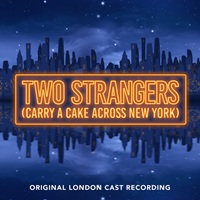 Original London Cast, 2024 (If I Believed Ltd)
Original London Cast, 2024 (If I Believed Ltd)  (2.5 / 5) This cast recording of Two Strangers (Carry a Cake Across New York) showcases the score of a charming, two-character show, but it struggles to maintain momentum across its full runtime. The story follows Dougal, a relentlessly upbeat young Brit played with wide-eyed energy by Sam Tutty, and Robin, a cynical New Yorker portrayed with grounded soulfulness by Dujonna Gift. The titular cake, which is only briefly mentioned on the recording, is for the wedding of Robin’s sister to Dougal’s father, and R&D are in charge of getting it to the wedding in one piece. The album gets off to a snappy start with the opening number, “New York,” but here and in other songs, the lyrics are often sloppy and contain a number of false rhymes. While Tutty and Gift have undeniable chemistry, some listeners may find the album disappointing as it indicates the show’s descent into a formulaic romantic comedy. On the plus side, there are chuckles to be had from “On The App,” a song that pokes fun at the frustrating dating app culture, as well as “Under the Mistletoe,” all about the forced, performative joy of the holiday season. And the score does supply Robin with two well-written ballads: the forlorn “What’ll It Be” introduces us to her character, while in the touching “This Year,” she reflects on the passage of time and the quiet ache of her own unfulfilled expectations. Unfortunately, these highlights are counterbalanced by a repetitive folk-pop formula that’s wanting in terms of melodic distinction. This score works better when one is experiencing the show live as compared to hearing it out of context; the wit is present, but the songs lack the “earworm” quality required to make them truly memorable, and for every moment of genuine vocal poignancy from Gift or infectious charisma from Tutty, there’s a stretch of musical dialogue that feels inert without the physical comedy to support it. In sum, this is a pleasant, well-produced album of an amiable entertainment, but the dearth of musical variety and the frequent surrender to lazy rhymes make it more valuable as a souvenir for those who are already fans of the show than as an example of an entirely successful musical theater recording. [Ed. Note: Though Two Strangers transferred to Broadway in 2025, that production has yielded no cast recording, presumably because this is a two actor/two character musical and one of the two Broadway performers — Sam Tutty — is heard on this London cast album.] — Forrest Hutchinson
(2.5 / 5) This cast recording of Two Strangers (Carry a Cake Across New York) showcases the score of a charming, two-character show, but it struggles to maintain momentum across its full runtime. The story follows Dougal, a relentlessly upbeat young Brit played with wide-eyed energy by Sam Tutty, and Robin, a cynical New Yorker portrayed with grounded soulfulness by Dujonna Gift. The titular cake, which is only briefly mentioned on the recording, is for the wedding of Robin’s sister to Dougal’s father, and R&D are in charge of getting it to the wedding in one piece. The album gets off to a snappy start with the opening number, “New York,” but here and in other songs, the lyrics are often sloppy and contain a number of false rhymes. While Tutty and Gift have undeniable chemistry, some listeners may find the album disappointing as it indicates the show’s descent into a formulaic romantic comedy. On the plus side, there are chuckles to be had from “On The App,” a song that pokes fun at the frustrating dating app culture, as well as “Under the Mistletoe,” all about the forced, performative joy of the holiday season. And the score does supply Robin with two well-written ballads: the forlorn “What’ll It Be” introduces us to her character, while in the touching “This Year,” she reflects on the passage of time and the quiet ache of her own unfulfilled expectations. Unfortunately, these highlights are counterbalanced by a repetitive folk-pop formula that’s wanting in terms of melodic distinction. This score works better when one is experiencing the show live as compared to hearing it out of context; the wit is present, but the songs lack the “earworm” quality required to make them truly memorable, and for every moment of genuine vocal poignancy from Gift or infectious charisma from Tutty, there’s a stretch of musical dialogue that feels inert without the physical comedy to support it. In sum, this is a pleasant, well-produced album of an amiable entertainment, but the dearth of musical variety and the frequent surrender to lazy rhymes make it more valuable as a souvenir for those who are already fans of the show than as an example of an entirely successful musical theater recording. [Ed. Note: Though Two Strangers transferred to Broadway in 2025, that production has yielded no cast recording, presumably because this is a two actor/two character musical and one of the two Broadway performers — Sam Tutty — is heard on this London cast album.] — Forrest Hutchinson


 (3 / 5)
(3 / 5)
 (2 / 5)
(2 / 5)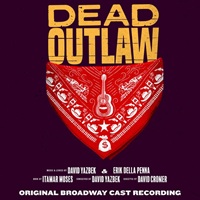
 (3.5 / 5) One of Broadway’s most versatile composers, David Yazbek collaborated with Erik Della Penna in creating the music and lyrics for Dead Outlaw, his most unusual project yet. The first half of the show’s book, by Itamar Moses, covers the life of train robber Elmer McCurdy. A botched robbery leads to McCurdy’s untimely death, and the second half of the show (and the cast album) portrays his body’s absurd, 60-year odyssey as a mummified carnival attraction. Inevitably, the full scope of Andrew Durand’s acclaimed performance as McCurdy is partly diminished on the recording, most obviously because his second-act mastery of physical stillness as a mummified corpse is not captured. Still, his vocal navigation of McCurdy’s vulnerability and rage is fully evident here; Durand is alluring in the show’s opening, “Ballad,” but his voice is full of ferocity in the punk-tinged “Killed a Man in Maine.” The colorful ensemble cast includes Broadway veterans Jeb Brown, Thom Sesma, and Ken Marks, along with relative newcomer Julia Knitel, who plays several roles. Knitel’s strongest moment is in the second act ballad “Millicent’s Song,” as she plays a teenage girl who confides her thoughts and anxieties to McCurdy’s corpse and his available, if unhearing, ears; here, her calming voice gives listeners a break from the score’s high-speed pace. The band, led by narrator Jeb Brown, shows off Yazbek’s blues-infused, rockabilly score and rips through the irresistibly catchy tune “Dead” while also leading the haunting chorus of the song “Crimson Thread.” That said, the most significant flaw of Dead Outlaw is the fact that too many of the songs were written for Brown and the onstage band to comment on the action of the play, rather than moving the story forward. “Up to the Stars,” “Nobody Knows Your Name,” and the aforementioned “Dead” are all fine songs, but they may leave the listener grasping for narrative threads. Ultimately, this unique endeavor can’t be counted as Yazbek’s best score, but don’t be surprised if some of the tunes stick in your head long after they should have died. [Note: Audible also released a complete recording of the entire show that is only available digitally.] — Forrest Hutchinson
(3.5 / 5) One of Broadway’s most versatile composers, David Yazbek collaborated with Erik Della Penna in creating the music and lyrics for Dead Outlaw, his most unusual project yet. The first half of the show’s book, by Itamar Moses, covers the life of train robber Elmer McCurdy. A botched robbery leads to McCurdy’s untimely death, and the second half of the show (and the cast album) portrays his body’s absurd, 60-year odyssey as a mummified carnival attraction. Inevitably, the full scope of Andrew Durand’s acclaimed performance as McCurdy is partly diminished on the recording, most obviously because his second-act mastery of physical stillness as a mummified corpse is not captured. Still, his vocal navigation of McCurdy’s vulnerability and rage is fully evident here; Durand is alluring in the show’s opening, “Ballad,” but his voice is full of ferocity in the punk-tinged “Killed a Man in Maine.” The colorful ensemble cast includes Broadway veterans Jeb Brown, Thom Sesma, and Ken Marks, along with relative newcomer Julia Knitel, who plays several roles. Knitel’s strongest moment is in the second act ballad “Millicent’s Song,” as she plays a teenage girl who confides her thoughts and anxieties to McCurdy’s corpse and his available, if unhearing, ears; here, her calming voice gives listeners a break from the score’s high-speed pace. The band, led by narrator Jeb Brown, shows off Yazbek’s blues-infused, rockabilly score and rips through the irresistibly catchy tune “Dead” while also leading the haunting chorus of the song “Crimson Thread.” That said, the most significant flaw of Dead Outlaw is the fact that too many of the songs were written for Brown and the onstage band to comment on the action of the play, rather than moving the story forward. “Up to the Stars,” “Nobody Knows Your Name,” and the aforementioned “Dead” are all fine songs, but they may leave the listener grasping for narrative threads. Ultimately, this unique endeavor can’t be counted as Yazbek’s best score, but don’t be surprised if some of the tunes stick in your head long after they should have died. [Note: Audible also released a complete recording of the entire show that is only available digitally.] — Forrest Hutchinson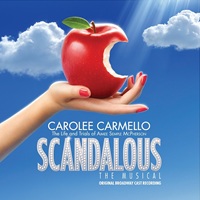
 (1.5 / 5) Carolee Carmello was tasked with carrying this show in the role of charismatic evangelist Aimee Semple McPherson, playing the character from age 15 to 50. One of Broadway’s most gifted belters, Carmello does her best with the material, but the songs fail to rise to the level of her immense talent. Though the cast album is dominated primarily by its star, she’s assisted ably by Ed Watts as Amy’s husband, Candy Buckley as her mother, and, in a very brief appearance, Broadway veteran George Hearn as her father. Carmello tears through the opening number, “Stand Up!” and admirably attempts to energize the proceedings with the fiery “Follow Me.” Listeners may be intrigued by these first two numbers, or by the appealing quartet “He Will Be My Home (reprise),” but the score’s limitations quickly become apparent. While the real life story of McPherson was full of sensational drama, from her sudden disappearance to an alleged affair that was highly publicized, the book of the musical — by television personality Kathie Lee Gifford — is meandering and full of clichés. (Scandalous played a paltry 29 performances on Broadway, and was widely panned by critics). The score, with lyrics by Gifford and music by David Pomeranz and David Friedman, also largely fails to capture the excitement of the central character’s life; songs such as “A Girl’s Gotta Do What a Girl’s Gotta Do” and “Lost or Found” are particularly dull. In fact, the second half of the album is nearly devoid of worth, and by the final number, “I Have a Fire,” even Carmello’s belt seems more stupefying than entertaining, as it has long since become clear that the creative team has relied on her talent alone to sell the subpar material. While the show straddles the fence as to whether “Sister” Aimee was “inspired or mired in sin,” there can be no doubt about Carmello’s gifts, even in this misfire. But the most unforgivable aspect of Scandalous is that it isn’t scandalous at all, it’s disappointingly bland. — Forrest Hutchinson
(1.5 / 5) Carolee Carmello was tasked with carrying this show in the role of charismatic evangelist Aimee Semple McPherson, playing the character from age 15 to 50. One of Broadway’s most gifted belters, Carmello does her best with the material, but the songs fail to rise to the level of her immense talent. Though the cast album is dominated primarily by its star, she’s assisted ably by Ed Watts as Amy’s husband, Candy Buckley as her mother, and, in a very brief appearance, Broadway veteran George Hearn as her father. Carmello tears through the opening number, “Stand Up!” and admirably attempts to energize the proceedings with the fiery “Follow Me.” Listeners may be intrigued by these first two numbers, or by the appealing quartet “He Will Be My Home (reprise),” but the score’s limitations quickly become apparent. While the real life story of McPherson was full of sensational drama, from her sudden disappearance to an alleged affair that was highly publicized, the book of the musical — by television personality Kathie Lee Gifford — is meandering and full of clichés. (Scandalous played a paltry 29 performances on Broadway, and was widely panned by critics). The score, with lyrics by Gifford and music by David Pomeranz and David Friedman, also largely fails to capture the excitement of the central character’s life; songs such as “A Girl’s Gotta Do What a Girl’s Gotta Do” and “Lost or Found” are particularly dull. In fact, the second half of the album is nearly devoid of worth, and by the final number, “I Have a Fire,” even Carmello’s belt seems more stupefying than entertaining, as it has long since become clear that the creative team has relied on her talent alone to sell the subpar material. While the show straddles the fence as to whether “Sister” Aimee was “inspired or mired in sin,” there can be no doubt about Carmello’s gifts, even in this misfire. But the most unforgivable aspect of Scandalous is that it isn’t scandalous at all, it’s disappointingly bland. — Forrest Hutchinson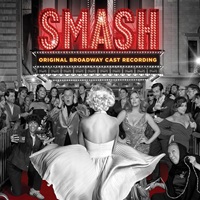
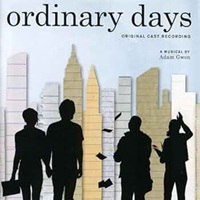
 (4 / 5)
(4 / 5) 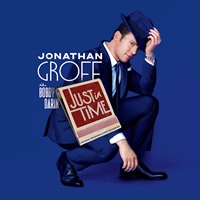
 (5 / 5) One sign of a true star is that the performer in question can triumph in a role in which they’re arguably miscast. A famous example of this is Audrey Hepburn in the film Breakfast of Tiffany’s — and another, far more recent example is Jonathan Groff in Just in Time, a bio-musical inspired by the life and career of the late, great pop singer Bobby Darin. When this project was announced, Groff was already beloved by audiences for his stage performances in such shows as Spring Awakening, Hamilton, and Merrily We Roll Along, not to mention his work on television (Glee, Looking, Mindhunter) and in movies (Frozen, Frozen II, etc.). Still, his casting as Darin was met with some raised eyebrows, even among his greatest fans, in that Groff bears very little if any resemblance to Darin in terms of physical appearance, vocal timbre, or style of singing. Another oddity of the project as heralded was the fact that, although Darin did record the Jule Styne-Betty Comden-Adolph Green song “Just in Time” (from the score of the musical Bells Are Ringing), that number is far more closely associated with Tony Bennett and is certainly not considered one of Darin’s biggest hits, a group of tunes that includes such items as “Splish-Splash,” “Mack the Knife,” “Beyond the Sea,” ” “Dream Lover,” “Lazy River,” and “Artificial Flowers.” The first of these two issues was cannily met head-on in the Broadway production by the bold decision to have Groff introduce himself by his own name upon his first entrance and declare that he would be playing the role of Bobby Darin, rather than attempting to embody that iconic figure in any imitative way. And as for the strangeness of the show’s title, no one in the audience, including the critics, seemed to care in light of Groff’s thoroughly charming, bravura performance and the show’s many other delights — perhaps chief among them the fabulous musical arrangements and orchestrations of Andrew Resnick and Michael Thurber (drum arrangements by Jared Schonig), played for all their worth by a roof-raising big band. Some of the supporting cast members have their moments to shine on the cast album, most notably Gracie Lawrence as Connie Francis. But this is Groff’s show, and as recorded here, his alternately smooth-as-silk and truly exciting renditions of the classic songs listed above (and others) will make it easy for listeners to understand why he received a Tony Award nomination for this stunning star turn. — Michael Portantiere
(5 / 5) One sign of a true star is that the performer in question can triumph in a role in which they’re arguably miscast. A famous example of this is Audrey Hepburn in the film Breakfast of Tiffany’s — and another, far more recent example is Jonathan Groff in Just in Time, a bio-musical inspired by the life and career of the late, great pop singer Bobby Darin. When this project was announced, Groff was already beloved by audiences for his stage performances in such shows as Spring Awakening, Hamilton, and Merrily We Roll Along, not to mention his work on television (Glee, Looking, Mindhunter) and in movies (Frozen, Frozen II, etc.). Still, his casting as Darin was met with some raised eyebrows, even among his greatest fans, in that Groff bears very little if any resemblance to Darin in terms of physical appearance, vocal timbre, or style of singing. Another oddity of the project as heralded was the fact that, although Darin did record the Jule Styne-Betty Comden-Adolph Green song “Just in Time” (from the score of the musical Bells Are Ringing), that number is far more closely associated with Tony Bennett and is certainly not considered one of Darin’s biggest hits, a group of tunes that includes such items as “Splish-Splash,” “Mack the Knife,” “Beyond the Sea,” ” “Dream Lover,” “Lazy River,” and “Artificial Flowers.” The first of these two issues was cannily met head-on in the Broadway production by the bold decision to have Groff introduce himself by his own name upon his first entrance and declare that he would be playing the role of Bobby Darin, rather than attempting to embody that iconic figure in any imitative way. And as for the strangeness of the show’s title, no one in the audience, including the critics, seemed to care in light of Groff’s thoroughly charming, bravura performance and the show’s many other delights — perhaps chief among them the fabulous musical arrangements and orchestrations of Andrew Resnick and Michael Thurber (drum arrangements by Jared Schonig), played for all their worth by a roof-raising big band. Some of the supporting cast members have their moments to shine on the cast album, most notably Gracie Lawrence as Connie Francis. But this is Groff’s show, and as recorded here, his alternately smooth-as-silk and truly exciting renditions of the classic songs listed above (and others) will make it easy for listeners to understand why he received a Tony Award nomination for this stunning star turn. — Michael Portantiere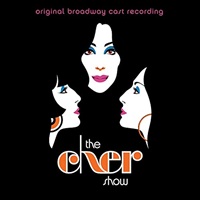
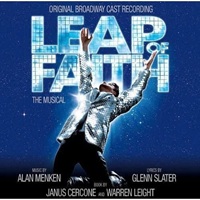
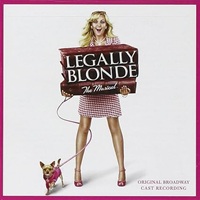
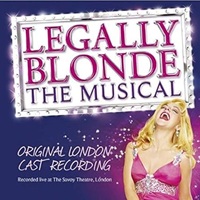

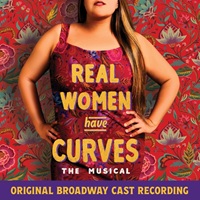
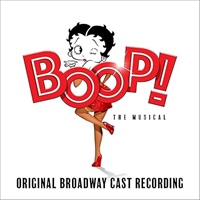

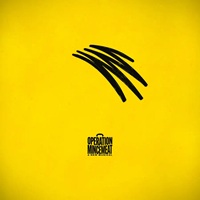
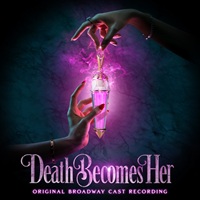
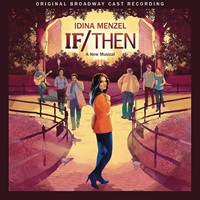
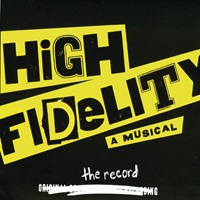
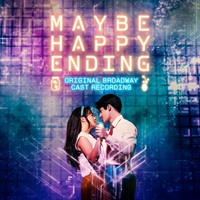
 (4.5 / 5) While Maybe Happy Ending’s story revolves around two humanoids known as Helperbots, the score is anything but robotic. In fact, the music by Will Aronson is decidedly passionate. Aronson uses light jazz melodies, paired with Hue Park’s simple and effective lyrics, to create a beautifully melancholy mood. With a book by Aronson and Park, this musical centers around Oliver and Claire, who are being stored in separate rooms in a retirement home for older Helperbot models. We first meet Oliver (played by Darren Criss) in the song “The World Within My Room,” as he moves through his daily routine in his solitary space with only his plant, named Hwaboon, for companionship, plus plenty of jazz records and magazines on hand for listening and reading. (Oliver’s erstwhile owner, James, loved that genre of music). The jazz songs featured on the records that Oliver plays are primarily sung by cast member Dez Duron, who croons pleasantly throughout the album. Claire, played by Helen J Shen, is a newer, more human-like model of Helperbot, though still considered obsolete. She intrudes on Oliver’s solitude one day when she knocks on his door asking to borrow his charger, and soon, the two of them decide to journey out of their storage center and see the world — Oliver hoping to find his onetime owner, James, Claire wanting to see fireflies for the first time. Criss plays Oliver with a stubborn optimism, and his singing is perfectly suited for the score. Shen gets more feisty character moments, but she also shows a sensitive side when she sings about loss in “What I Learned From People.” The pair’s quirky charm is captured wonderfully in the duet “The Rainy Day We Met,” in which they create a fictional, romantic backstory for themselves in case they are questioned on their adventure. The instrumentals in Maybe Happy Ending should also be mentioned, as they make for some of the most effective tracks on the album. “Why Love” is a melody repeated throughout the score, but it never sounds sweeter than when arranged for solo piano, and one can almost see the magic of the fireflies during the orchestral piece “Chasing Fireflies.” The concept of this show, the cast, and the music all combine to tell a moving story of love, loss, and — most surprisingly — mortality. — Forrest Hutchinson
(4.5 / 5) While Maybe Happy Ending’s story revolves around two humanoids known as Helperbots, the score is anything but robotic. In fact, the music by Will Aronson is decidedly passionate. Aronson uses light jazz melodies, paired with Hue Park’s simple and effective lyrics, to create a beautifully melancholy mood. With a book by Aronson and Park, this musical centers around Oliver and Claire, who are being stored in separate rooms in a retirement home for older Helperbot models. We first meet Oliver (played by Darren Criss) in the song “The World Within My Room,” as he moves through his daily routine in his solitary space with only his plant, named Hwaboon, for companionship, plus plenty of jazz records and magazines on hand for listening and reading. (Oliver’s erstwhile owner, James, loved that genre of music). The jazz songs featured on the records that Oliver plays are primarily sung by cast member Dez Duron, who croons pleasantly throughout the album. Claire, played by Helen J Shen, is a newer, more human-like model of Helperbot, though still considered obsolete. She intrudes on Oliver’s solitude one day when she knocks on his door asking to borrow his charger, and soon, the two of them decide to journey out of their storage center and see the world — Oliver hoping to find his onetime owner, James, Claire wanting to see fireflies for the first time. Criss plays Oliver with a stubborn optimism, and his singing is perfectly suited for the score. Shen gets more feisty character moments, but she also shows a sensitive side when she sings about loss in “What I Learned From People.” The pair’s quirky charm is captured wonderfully in the duet “The Rainy Day We Met,” in which they create a fictional, romantic backstory for themselves in case they are questioned on their adventure. The instrumentals in Maybe Happy Ending should also be mentioned, as they make for some of the most effective tracks on the album. “Why Love” is a melody repeated throughout the score, but it never sounds sweeter than when arranged for solo piano, and one can almost see the magic of the fireflies during the orchestral piece “Chasing Fireflies.” The concept of this show, the cast, and the music all combine to tell a moving story of love, loss, and — most surprisingly — mortality. — Forrest Hutchinson
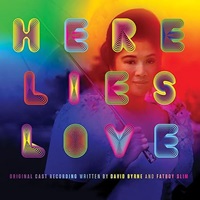
 (1 / 5) It’s unfortunate that we have to judge the 2013 Off-Broadway production of Here Lies Love based solely on this audio recording, as the immersive presentation at The Public Theater was such a key part of its appeal. The show was sung-through, and some songs heard on the concept album were cut while others were added, to overall little effect. The cast album pulsates with synthesized beats, but similar to its predecessor, the songs become repetitive, without providing interesting lyrics or any understanding of the characters’ motives. Imelda is sung by the extremely talented Ruthie Ann Miles. She nails the title song, one of the many melodies that might get stuck in your head as you listen. Her voice cuts through the monotonous music, and though the role itself lacks depth, Miles is a consistently charismatic presence. Ferdinand Marcos is given an unremarkable performance by Jose Llana; surprisingly, Marcos is not the most prominently featured male character in the show; that would be Ninoy Aquino, a political reformer who had a relationship with Imelda when they were young, but who became one of the leading critics of the Marcos administration. (Think of Che in Evita.) Aquino is played by Conrad Ricamora, who gets to show off more emotional range than the others in songs such as “Child of the Philippines” and “Gate 37.” (This character largely replaces the role of the nanny, Estrella Cumpos on the concept album as a grounding presence in Imelda’s life and a reminder of her impoverished childhood.) The album is primarily an endless procession of funk music, interrupted briefly by the penultimate song, “God Draws Straight,” a soft melody accompanied by a single ukulele. The bulk of the score is better suited to a dance club setting than to close listening. If you can get your hands on a physical copy of the CD edition, it’s a colorful double-disc set that includes an 80 (!) page booklet with summaries for each track on the recording. Perhaps the feeling that it was necessary to include song summaries should be seen as an indication that prospective listeners may want to exercise caution. [Editor’s Note: A Broadway production of Here Lies Love, which attempted to recreate the immersive quality of the Off-Broadway presentation, opened in the summer of 2023. It ran for only 150 performances and three previews, and it yielded no cast album.] — F.H.
(1 / 5) It’s unfortunate that we have to judge the 2013 Off-Broadway production of Here Lies Love based solely on this audio recording, as the immersive presentation at The Public Theater was such a key part of its appeal. The show was sung-through, and some songs heard on the concept album were cut while others were added, to overall little effect. The cast album pulsates with synthesized beats, but similar to its predecessor, the songs become repetitive, without providing interesting lyrics or any understanding of the characters’ motives. Imelda is sung by the extremely talented Ruthie Ann Miles. She nails the title song, one of the many melodies that might get stuck in your head as you listen. Her voice cuts through the monotonous music, and though the role itself lacks depth, Miles is a consistently charismatic presence. Ferdinand Marcos is given an unremarkable performance by Jose Llana; surprisingly, Marcos is not the most prominently featured male character in the show; that would be Ninoy Aquino, a political reformer who had a relationship with Imelda when they were young, but who became one of the leading critics of the Marcos administration. (Think of Che in Evita.) Aquino is played by Conrad Ricamora, who gets to show off more emotional range than the others in songs such as “Child of the Philippines” and “Gate 37.” (This character largely replaces the role of the nanny, Estrella Cumpos on the concept album as a grounding presence in Imelda’s life and a reminder of her impoverished childhood.) The album is primarily an endless procession of funk music, interrupted briefly by the penultimate song, “God Draws Straight,” a soft melody accompanied by a single ukulele. The bulk of the score is better suited to a dance club setting than to close listening. If you can get your hands on a physical copy of the CD edition, it’s a colorful double-disc set that includes an 80 (!) page booklet with summaries for each track on the recording. Perhaps the feeling that it was necessary to include song summaries should be seen as an indication that prospective listeners may want to exercise caution. [Editor’s Note: A Broadway production of Here Lies Love, which attempted to recreate the immersive quality of the Off-Broadway presentation, opened in the summer of 2023. It ran for only 150 performances and three previews, and it yielded no cast album.] — F.H.